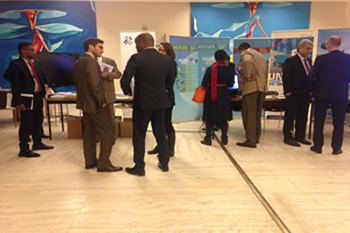International Forum for NTF Committees (part 2/2)
About 300 delegates from all over the world braved the frosty outdoor temperatures in Geneva in late January to attend the first International Forum for National Trade Facilitation Committees at the United Nations. Myself, Dr. Sangeeta Mohanty, had the good fortune of representing Cross-border Research Association at this memorable event. This Blog (part 2 of 2) covers the last three days of the forum.
The second half of the forum centred on defining the role of National Trade Facilitation Committees, NTFCs, in Trade Facilitation reforms, the specification of concrete processes and detailed recommendations on establishing and sustaining NTFCs. Real live issues encountered during the reform process were brought to the forefront. Another highlight was the trade fair where organisations presented their Trade Facilitation programmes and supporting tools, offering participants information on a one-to-one basis. This also provided a unique opportunity for government representatives to explore possibilities of bilateral assistance with donor institutions. Quite interestingly, the International Customs Day happened to fall during this one-week event that served as a reminder of the leading role of customs in the monitoring and management of international trade. Speakers reinforced the central role of customs in bringing about wide-scale reforms to cross-border trade operations and procedures.
The first panel discussions dealt with the scope, mandate, recommended governance and management styles of NTFCs to establish a healthy breeding ground for mutual understanding, trust and cooperation among the parties involved. Potential problems and pitfalls were discussed at great length. Speakers from Sudan and Morocco shared their experiences in setting up NTFCs, including challenges and lessons learned. Senior representatives from Nigeria and Togo highlighted the most important elements to be taken into consideration. They key considerations expressed by the Nigerian expert were the empowerment of Trade Facilitation committees to take binding decisions, aligning the national policies and legislations with the WTO TFA provisions, and sensitising the private sector to the WTO TFA. The representative from Togo elaborated on the difficulties encountered with regard to budget, financing, resources, membership, training and capacity building. The WCO expert drew attention to a number of issues associated with information and intelligence data gathering, professional development, talent management, technical competence and training.
Private sector engagement that was briefly touched upon in the first half of the forum became the main focus of the next session. It was commonly agreed that businesses can play an instrumental role in the long-term success of Trade Facilitation activities. The Global Alliance programme, a public-privat -partnership is based on the premise that neither the public nor the private sector can independently achieve the WTO TFA goals. Several institutional barriers to cooperation were discussed by experts from Pakistan and Jamaica. Nigeria was cited as a more successful example, with a well-organised private sector and institutionalised cooperation between government and industry stakeholders. From the discussion it emerged that the logistics sector is generally less represented and active efforts must be made for a balanced representation of interests from each stakeholder category. A tripartite structure of governance consisting of national regulators, other relevant governmental stakeholders and industry actors was advocated. The progressive building of mutual trust and confidence between industry and government was considered the key to establishing successful partnership. Further, stakeholders are advised to build up a good communication strategy to be included in the decision-making agenda. The overall message for successful engagement was encapsulated in three keywords: inclusive, comprehensive and coordinated.
The reference to coordination paved the way for the dialogue around Coordinated Border Management and the involvement of NTFCs in this dynamic process. The example of the one-stop border post between Zimbabwe and Zambia was presented, reiterating the issue around trust and alignment. Coordinated Border Management was summed up as an engineered process of shared resources, shared responsibility, shared work, as well as an interplay between national committees. Striking a balance between legal, operational, technical, and human resource processes was recommended for effective border management.
Creating and driving a National Trade Facilitation roadmap was considered integral to Trade Facilitation reforms. Governments are advised to refer to the UNECE guide that was successfully applied by Greece. Speakers outlined the different phases of establishing a Trade Facilitation implementation roadmap and various strategies to address major challenges. A number of guiding principles were put forward, such as defining a strategic vision, establishing clear-cut goals, setting up steering and management groups, creating technical working groups, and establishing measurable performance indicators.
Insights were provided on the drafting of project proposals. It is imperative that drafting proposals is a participatory process involving all actors likely to be affected or expected to have a role in enabling project success. The proposal should outline a coherent set of planned activities reflecting the objectives of the donors. The core message delivered was to ensure inclusive participation, find common grounds of interest and align the proposal with the objectives of the funder.
The forum concluded with an extensive discussion around the specific role of NTFCs in the evaluation and monitoring of reform processes and in shaping the future of Trade Facilitation. An overview of the WCO tools for monitoring and evaluation was given, namely the Time Release Study and the SAFE Framework of Standards – Self- Assessment Checklist. The private sector was viewed as a valuable instrument in the monitoring process. Since businesses have legitimate reasons for efficient border management, leveraging public-private dialogue in each step of the reform process was considered vital. Coordinated Border Management and Information and Communication Technologies, ICT, were considered two important pillars of Trade Facilitation reforms. Strengthening border management and ICT based modernisation of services is expected to play an increasingly significant role in global trade. In this context, the Automated Systems for Customs Data, ASYCUDA, and the Online Intelligence Trade Portal of the International Trade Center, ITC, were elucidated. ASYCUDA is a computerised system designed by UNCTAD to assist customs authorities to control and automate their core processes, whereas the trade portal aims to be the one-stop shop for trade related intelligence on international markets for the business community and governmental sectors.
To sum up briefly, the WTO TFA is driven by three main objectives: reduction of administrative burdens in cross-border trade; effective cooperation between customs and other relevant authorities; and institutionalisation of a system of continual capacity building. The general consensus was that 2017 is the year of implementation of this ambitious Trade Facilitation agenda and reinforcing multi-stakeholder partnership. NTFCs are advised to serve as the leading platform for public-private dialogue, ensure broad participation and integration of all stakeholders. Businesses are uniquely positioned to inform policy makers and must be informed of the resulting benefits from the engagement of Trade Facilitation bodies. In view of this, the ITC’s long experience in evidence based public-private dialogue has given attention to the critical role of the private sector. Governments must break away from the controlling mindset and the private sector must rise above self-interest to contribute to inclusive economic growth. It is incumbent on all stakeholders to work towards these ends in recognition of the major role that trade can play in achieving sustainable development and eradicating poverty.
Part 2 of 2 of the CBRA NTFC-Blog by Dr. Sangeeta Mohanty.





